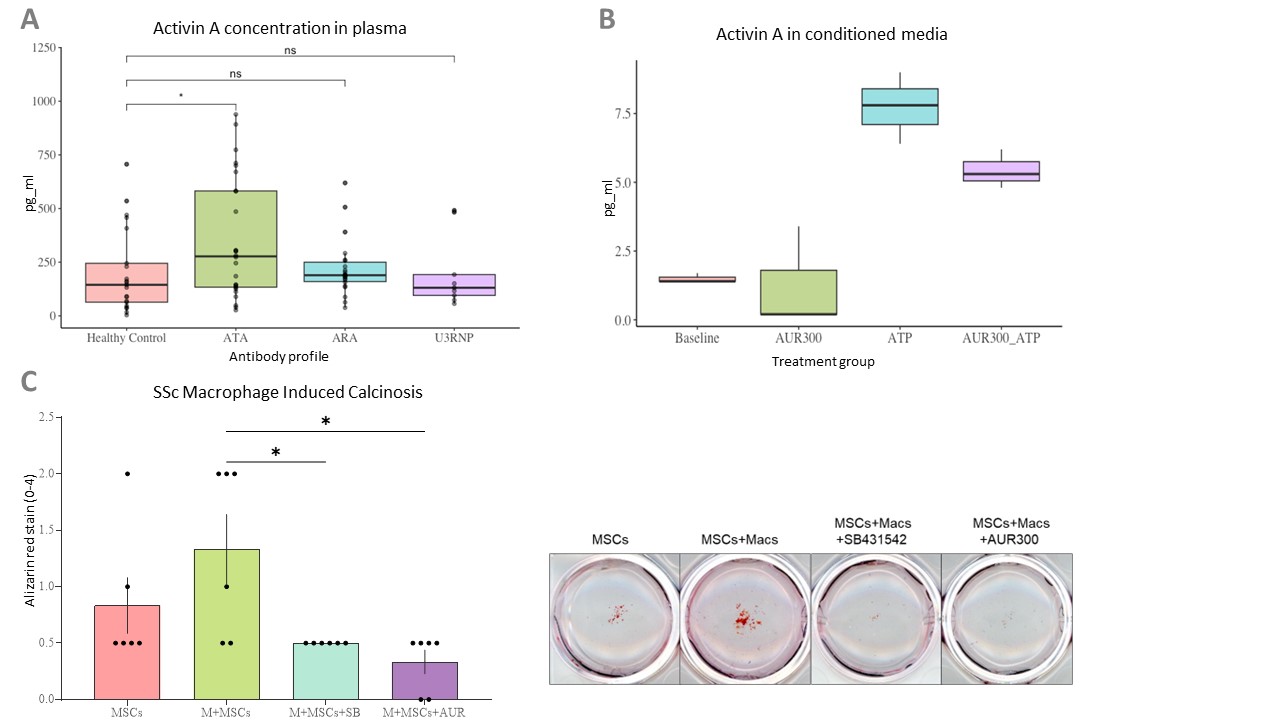Session Information
Date: Tuesday, November 14, 2023
Title: (2352–2369) Systemic Sclerosis & Related Disorders – Clinical Poster III: Translational Science
Session Type: Poster Session C
Session Time: 9:00AM-11:00AM
Background/Purpose: Calcinosis may result from localised trans-differentiation of tissue resident stem cells in the subcutaneous layer of affected skin in systemic sclerosis (SSc), as a severe disabling manifestation linked to ischaemia and local trauma.Beyond SSc, inherited defects in Activin A responsive pathway (ACTVAR1) result in widespread calcinosis, as seen in Fibrodysplasia Ossificans Progessiva, where macrophages are implicated as the source of excess tissue Activin A.We investigated the possible induction of SSc calcinosis in a tissue culture model generated by stimulation of adipose derived mesenchymal stem cells (MSCs) with SSc patients’ macrophages and explored the relevance of the Activin A pathway.
Methods: Clinical associations were screened in a database of well-characterised SSc patients with symptomatic calcinosis (n=28) and SSc without calcinosis (n=51). Human subcutaneous fat derived MSCs were cultured in osteogenic media, with or without SSc patients’ monocyte-derived macrophages, with or without inhibitors, AUR300 10µM (peptide inhibitor of M2 macrophages) or SB431542 10µM (antagonist of Activin/ALK5 pathway). Cultures were stained with Alizarin red for osteogenesis on day 21. Macrophage secreted levels of Activin A under basal and ATP-stimulated conditions, were assayed by ELISA (Biotechne), as were plasma levels in n= 57 diffuse SSc patients (n=26 anti-Scl70, n=22 anti-RNA polymerase and 9 anti-U3RNP subgroup) and 21 healthy controls (HC).
Results: Most clinical characteristics did not differ significantly between patients with calcinosis and those without, including clinical subset, age, gender, disease duration, organ involvement or autoantibody subtype (all P values NS), whereas digital ulceration (DU) was associated with calcinosis (DU in 16/28 calcinosis and 13/51 no calcinosis, chi square P< 0.008). Notably, Activin A levels were increased in SSc patients’ plasma samples when compared to controls, only in diffuse anti-Scl70 patient subgroup (plasma Activin A healthy controls 147, 80-249, anti-Scl70 SSc 261, 136-590 pg/ml, median, IQR, P< 0.05 Mann Whitney) (Figure 1A). Moreover, anti-Scl70 SSc patients’ macrophages, released Activin A in tissue culture, enhanced by stimulation with BzATP (0.1 µM) and inhibited by AUR300 (10µM) (Figure 1B), and stimulated calcinosis in the MSC model, where addition of SSc macrophages (M) to the MSC cultures induced Alizarin red positive osteogenic foci at 21 days, blocked by both AUR300 and SB431542 (MSCs 0.833+/-0.247, MSCs+M 1.33+/-0.307, MSCs+M+SB 0.5+/-0, MSCs+M+AUR300 0.33+/-0.105, Alizarin Red stain 0-4, P< 0.012 for AUR300 effect) (Figure 1C).
Conclusion: Calcinosis occurs in both diffuse and limited SSc subsets and across autoantibody subgroups and was associated with digital ulceration.Elevated plasma levels of Activin A, most notable in anti-Scl70 subgroup, is consistent with systemic upregulation of the Activin A pathway in SSc.Activated macrophages from SSc patients are a potential source of Activin A capable of stimulating MSCs via an osteogenic/calcinosis model.The AUR300 and SB431542 compounds as studied represent potential therapeutic inhibitors of this severe and currently resistant complication of SSc.
To cite this abstract in AMA style:
Searle T, Kalluri U, Ahmad S, Ahmed Abdi B, Lopez S, Xu S, Collins T, Cross J, Martin G, Lopez H, Yates C, Stratton R. Systemic Sclerosis Macrophages Stimulate Calcinosis in Adipose Derived Mesenchymal Stem Cells via the Activin a Pathway [abstract]. Arthritis Rheumatol. 2023; 75 (suppl 9). https://acrabstracts.org/abstract/systemic-sclerosis-macrophages-stimulate-calcinosis-in-adipose-derived-mesenchymal-stem-cells-via-the-activin-a-pathway/. Accessed .« Back to ACR Convergence 2023
ACR Meeting Abstracts - https://acrabstracts.org/abstract/systemic-sclerosis-macrophages-stimulate-calcinosis-in-adipose-derived-mesenchymal-stem-cells-via-the-activin-a-pathway/

